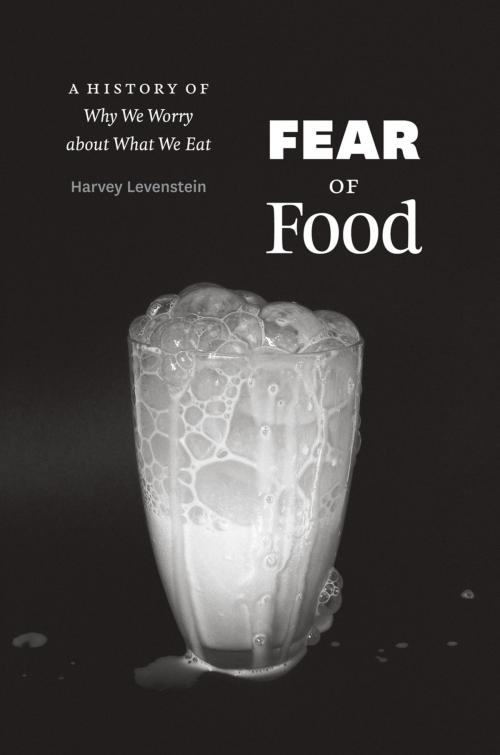Fear of Food
A History of Why We Worry about What We Eat
Nonfiction, Science & Nature, Science, Other Sciences, History, Americas, United States| Author: | Harvey Levenstein | ISBN: | 9780226473734 |
| Publisher: | University of Chicago Press | Publication: | February 14, 2012 |
| Imprint: | University of Chicago Press | Language: | English |
| Author: | Harvey Levenstein |
| ISBN: | 9780226473734 |
| Publisher: | University of Chicago Press |
| Publication: | February 14, 2012 |
| Imprint: | University of Chicago Press |
| Language: | English |
There may be no greater source of anxiety for Americans today than the question of what to eat and drink. Are eggs the perfect protein, or are they cholesterol bombs? Is red wine good for my heart or bad for my liver? Will pesticides, additives, and processed foods kill me? Here with some very rare and very welcome advice is food historian Harvey Levenstein: Stop worrying!
In Fear of Food Levenstein reveals the people and interests who have created and exploited these worries, causing an extraordinary number of Americans to allow fear to trump pleasure in dictating their food choices. He tells of the prominent scientists who first warned about deadly germs and poisons in foods, and their successors who charged that processing foods robs them of life-giving vitamins and minerals. These include Nobel Prize–winner Eli Metchnikoff, who advised that yogurt would enable people to live to be 140 by killing the life-threatening germs in their intestines, and Elmer McCollum, the “discoverer” of vitamins, who tailored his warnings about vitamin deficiencies to suit the food producers who funded him. Levenstein also highlights how large food companies have taken advantage of these concerns by marketing their products to combat the fear of the moment. Such examples include the co-opting of the “natural foods” movement, which grew out of the belief that inhabitants of a remote Himalayan Shangri-la enjoyed remarkable health and longevity by avoiding the very kinds of processed food these corporations produced, and the physiologist Ancel Keys, originator of the Mediterranean Diet, who provided the basis for a powerful coalition of scientists, doctors, food producers, and others to convince Americans that high-fat foods were deadly.
In Fear of Food, Levenstein offers a much-needed voice of reason; he expertly questions these stories of constantly changing advice to reveal that there are no hard-and-fast facts when it comes to eating. With this book, he hopes to free us from the fears that cloud so many of our food choices and allow us to finally rediscover the joys of eating something just because it tastes good.
There may be no greater source of anxiety for Americans today than the question of what to eat and drink. Are eggs the perfect protein, or are they cholesterol bombs? Is red wine good for my heart or bad for my liver? Will pesticides, additives, and processed foods kill me? Here with some very rare and very welcome advice is food historian Harvey Levenstein: Stop worrying!
In Fear of Food Levenstein reveals the people and interests who have created and exploited these worries, causing an extraordinary number of Americans to allow fear to trump pleasure in dictating their food choices. He tells of the prominent scientists who first warned about deadly germs and poisons in foods, and their successors who charged that processing foods robs them of life-giving vitamins and minerals. These include Nobel Prize–winner Eli Metchnikoff, who advised that yogurt would enable people to live to be 140 by killing the life-threatening germs in their intestines, and Elmer McCollum, the “discoverer” of vitamins, who tailored his warnings about vitamin deficiencies to suit the food producers who funded him. Levenstein also highlights how large food companies have taken advantage of these concerns by marketing their products to combat the fear of the moment. Such examples include the co-opting of the “natural foods” movement, which grew out of the belief that inhabitants of a remote Himalayan Shangri-la enjoyed remarkable health and longevity by avoiding the very kinds of processed food these corporations produced, and the physiologist Ancel Keys, originator of the Mediterranean Diet, who provided the basis for a powerful coalition of scientists, doctors, food producers, and others to convince Americans that high-fat foods were deadly.
In Fear of Food, Levenstein offers a much-needed voice of reason; he expertly questions these stories of constantly changing advice to reveal that there are no hard-and-fast facts when it comes to eating. With this book, he hopes to free us from the fears that cloud so many of our food choices and allow us to finally rediscover the joys of eating something just because it tastes good.















